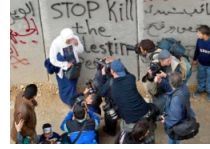 Does the media report the story or does it play some role in creating it? Writing in the Spectator, Rod Liddle observes a confrontation in Hebron between a Palestinian youth and Israeli soldiers:
Does the media report the story or does it play some role in creating it? Writing in the Spectator, Rod Liddle observes a confrontation in Hebron between a Palestinian youth and Israeli soldiers:
In the world league-table of atrocities this is small beer – and, for film crews used to operating in tense and dangerous parts of the globe, a familiar and perhaps minor ethical problem. The Israeli soldier was right, though, in his implication: if we had not been there, this would not have happened. If you build it, they will come, etc. The kid was grandstanding for the cameras and, as a result, will get a beating. If we – or some other TV monkeys – had not been there, it would not have happened. (Emphasis added.) We were there to witness injustice; and also, if possible, exacerbate it for the benefit of the viewing public.
The Israeli government is rightly worried that the Palestinians have captured the moral high ground by precisely such tactics, if they are tactics. It is aware that the Palestinian PR machine wins hands down, as it has done since the first Intifada, back in the late 1980s – kids with rocks versus a professional army with heavy ordnance and, behind even that, the USA. And when the TV crews, or the international observers are around, the Palestinians play it up for all it is worth; they know how it will go down with an international audience.
Read the full article here.
CALL FOR JOHNSTON’S RELEASE
 HonestReporting UK has frequently criticised the BBC’s Mideast coverage and the reporting by some of its journalists. We are aware that some reporting from the Palestinian Territories is adversely affected by intimidation and threats of violence. BBC correspondent Alan Johnston has now spent over 4 weeks in captivity following his seizure by Palestinian gunmen in Gaza. Such is the level of lawlessness and violence, the UN is reportedly considering formally declaring the Gaza Strip a dangerous zone, which would lead to the evacuation of remaining foreign nationals. It is clear that foreign journalists cannot possibly report objectively from the Gaza Strip while under the threat of intimidation, violence or kidnapping.
HonestReporting UK has frequently criticised the BBC’s Mideast coverage and the reporting by some of its journalists. We are aware that some reporting from the Palestinian Territories is adversely affected by intimidation and threats of violence. BBC correspondent Alan Johnston has now spent over 4 weeks in captivity following his seizure by Palestinian gunmen in Gaza. Such is the level of lawlessness and violence, the UN is reportedly considering formally declaring the Gaza Strip a dangerous zone, which would lead to the evacuation of remaining foreign nationals. It is clear that foreign journalists cannot possibly report objectively from the Gaza Strip while under the threat of intimidation, violence or kidnapping.
So central is this affront to the freedom of the press and expression in the region that we are supporting the BBC’s international day of action to highlight the plight of Alan Johnston. We also cannot forget Israeli soldiers Gilad Shalit, Ehud Goldwasser and Eldad Regev who remain in captivity. Britain is coming to terms with the seizure and cynical manipulation of its own naval personnel by Iran. We are reminded that those who resort to such kidnappings share a common ideology and pursuit of terrorist actions in an arc that stretches from Gaza, through South Lebanon all the way to Tehran, manipulating the media to serve their own evil agendas.
Sign the BBC online petition calling for Johnston’s immediate release here.
WALL ST JOURNAL TAKES BBC TO TASK
The continuing court case concerning the BBC’s attempts to prevent the release of the Balen Report has not gone unnoticed across the Atlantic. The Wall Street Journal criticises the BBC’s use of “taxpayers’ money to hide its own work from scrutiny” and the corporation’s bias:
The BBC routinely rejects charges of anti-Israel bias, often by noting that it also gets complaints from Palestinians. If both sides are unhappy, the argument goes, the BBC must be getting the story right. This of course would assume that both sides are equally justified in complaining. To pretend that Hamas statements are as reliable as those from accountable Israeli government officials is bias masquerading as even-handedness….
There are numerous other examples that point to a simplistic narrative that invariably portrays Israel as the aggressor and the Palestinians as mere victims. Emblematic of this mindset is Jeremy Bowen, who was recently appointed as Middle East editor. In January, Mr. Bowen sent what he called a “mini briefing” to BBC senior executives and editors. This email was leaked and provided a rare look into the worldview that informs BBC coverage of the Middle East.
Written during the height of the internecine fighting between Hamas and Fatah, Mr. Bowen explained that “What is new…is the way that Palestinian society, which used to draw strength from resistance to the occupation, is now fragmenting” (emphasis ours). Mr. Bowen seems to have internalized Palestinian propaganda, which likes to speak of “resistance” when what is really meant is terrorism. The word terrorism, by the way, is banned at the Beeb, ostensibly because it’s a value judgment. Mr. Bowen continued to see the “death of hope, caused” — no surprise here — “by a cocktail of Israel’s military activities, land expropriations and settlement building.”
In other words, even when Palestinians were killing each other, it was Israel’s fault. Talk about the soft bigotry of low expectations: The Palestinians could not possibly be held accountable for their actions. There was no word in Mr. Bowen’s “briefing” that Israel had evacuated Gaza and that Palestinians elected Hamas into government, which refuses both to accept Israel’s right to exist and to abandon terror.
Read the full op-ed here.
to media bias.

